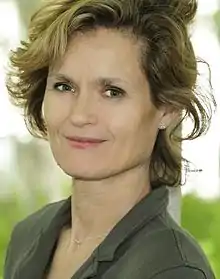Helga Trüpel
Helga Trüpel (born 21 July 1958) is a German politician who served as Member of the European Parliament (MEP) from 2004 until 2019. She is a member of the Alliance '90/The Greens, part of the European Green Party.[1]
Helga Trüpel | |
|---|---|
 | |
| Member of the European Parliament | |
| In office 1 July 2004 – 2019 | |
| Constituency | Germany |
| Personal details | |
| Born | 21 July 1958 Moers, North Rhine-Westphalia, West Germany |
| Political party | Alliance '90/The Greens The Greens–European Free Alliance |
| Alma mater | University of Bremen |
| Website | www |
From 1991 to 1995 Trüpel served as State Minister for Culture and the Integration of Immigrants in the City State of Bremen.[2][3]
Educational background
Helga Trüpel studied German, Religious Studies, and Psychology at the University of Bremen. In 1988 she completed her PhD in German Literature.
Political career
In 1980 Trüpel joined the political party Die Grünen, today called Bündnis 90/Die Grünen. From 1987 to 1991 and again from 1995 to 2004 she was an elected member of the State Parliament of Bremen. In 1991 she joined the state government as State Minister for Culture and the Integration of Immigrants, in the coalition government of the President of the Senate and Mayor of the Free Hanseatic City of Bremen Klaus Wedemeier.
In 2004, 2009 and 2014 Trüpel was elected Member of the European Parliament where she joined the political group The Greens/EFA.[4] From 2004 she was a vice-president of the European Parliament's Committee on Culture and Education.[5] Between 2004 and 2014 Trüpel worked as her parliamentary group's spokesperson for budgetary affairs.[6] During both her first and second terms she was furthermore elected co-spokesperson of the delegation of German Greens. In addition to her committee assignments, Trüpel was also member of the European Parliament's Delegation for Relations with the People's Republic of China.[7]
In September 2017, Trüpel announced that she would not stand in the 2019 European elections but instead resign from active politics by the end of the parliamentary term.[8][9]
References
- Bündnis 90/ Die Grünen
- de:Liste der Bremer Senatoren
- "Helga TRÜPEL - Home - Abgeordnete - Europäisches Parlament". www.europarl.europa.eu.
- "Home". www.greens-efa.eu.
- "Von besonderem Interesse - Home - CULT - Ausschüsse - Europäisches Parlament". www.europarl.europa.eu.
- "Von besonderem Interesse - Home - BUDG - Ausschüsse - Europäisches Parlament". www.europarl.europa.eu.
- "Home - Volksrepublik China - Delegationen - Europäisches Parlament". www.europarl.europa.eu.
- Marcel Leubecher (October 5, 2017), „Ich will aufrütteln - und nichts mehr werden“ Die Welt.
- Jan Zier (October 12, 2017), „Ich will keine Posten mehr“ Die Tageszeitung.